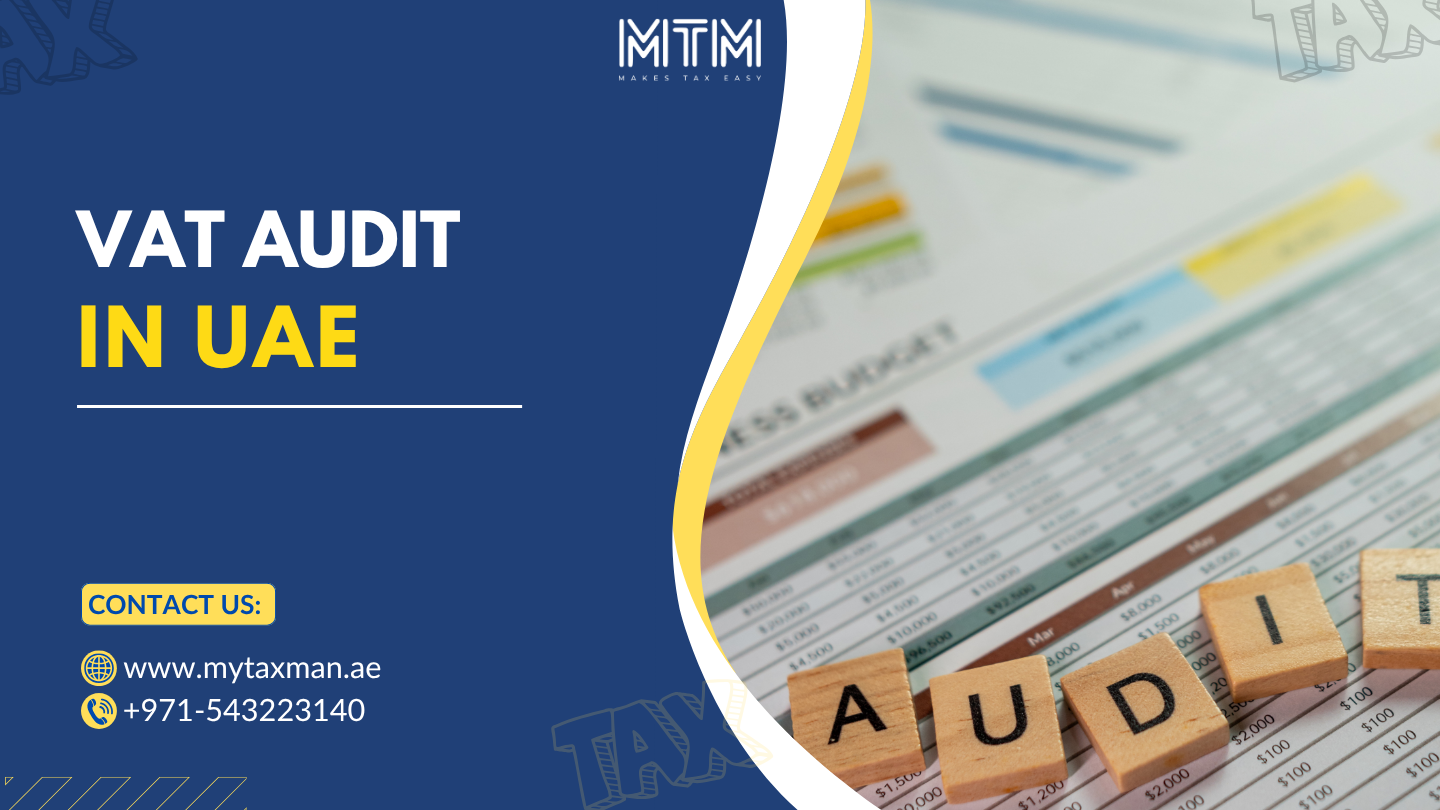Since the introduction of Value Added Tax in 2018, the Federal Tax Authority (FTA) has intensified its audit activities to ensure businesses across the UAE comply with VAT in UAE regulations. A VAT Audit is not merely a routine check—it’s a comprehensive examination of your business’s tax records, VAT returns, and compliance practices that can significantly impact your operations if you’re unprepared. With new VAT audit protocols taking effect in March 2025, understanding the audit process has become more critical than ever for businesses of all sizes. Whether you operate a startup, SME, or large enterprise in Dubai, Abu Dhabi, or any UAE emirate, this comprehensive guide will equip you with everything you need to know about VAT Audit Services, preparation strategies, compliance requirements, and how to navigate FTA audits successfully.
Table of Contents
ToggleWhat is a VAT Audit?
A VAT Audit is an official inspection conducted by the Federal Tax Authority to verify that businesses are accurately charging, collecting, and remitting the 5% VAT on taxable supplies while following all regulatory requirements. According to Federal Decree-Law No. 47 of 2022 on the Taxation of Corporations and Businesses, the FTA has the authority to conduct comprehensive audits of commercial records, information, and data related to businesses conducting taxable activities.
The audit process involves:
- Examination of VAT returns for selected periods
- Cross-checking returns against invoices and accounting records
- Review of input tax claims and output tax calculations
- Verification of tax invoice compliance
- Assessment of record-keeping practices
- Analysis of VAT refund claims and adjustments

Types of VAT Audits in UAE
The FTA conducts two primary types of VAT audits:
Desk Audits:
- Remote document checks conducted at FTA offices
- Review of submitted VAT returns and supporting documents
- Analysis of electronic records and digital submissions
- Typically triggered by data inconsistencies or refund claims
Field Audits:
- On-site inspections at business premises
- Physical examination of inventory and assets
- Face-to-face interviews with management and staff
- Review of original documents and business operations
- May involve temporary closure for up to 72 hours in suspected tax evasion cases
When Does the FTA Conduct VAT Audits?
The FTA may initiate a VAT Audit for various reasons, though receiving an audit notice doesn’t necessarily indicate wrongdoing. Understanding what triggers audits helps businesses proactively address potential issues.
Primary Audit Triggers Include:
- Inconsistencies in VAT Returns: Discrepancies between VAT returns and financial statements, mismatched input/output tax amounts, or incorrect reporting of taxable supplies
- High or Unusual VAT Refund Claims: Large refund claims compared to industry norms or business size, especially without corresponding output VAT
- Frequent Return Amendments: Multiple corrections to previously filed returns over consecutive quarters
- Late Payments or Filing Delays: Consistent delays in VAT payments or missed filing deadlines
- Significant Errors in Returns: Regular overstatements or understatements of tax liabilities
- Failure to Maintain Proper Documentation: Missing or incomplete supporting documents for VAT claims
- Industry-Specific Risk Factors: Businesses operating in sectors prone to tax evasion like real estate, construction, or high-value trading
- Association with Non-Compliant Entities: Connections to suppliers or clients under regulatory scrutiny
- Random Compliance Checks: Routine audits as part of FTA’s systematic compliance verification program
New VAT Audit Protocols for 2025
Major amendments to VAT Executive Regulations took effect in March 2025, fundamentally altering how businesses prepare for audits:
- Stringent Record-Keeping Obligations: Enhanced requirements for detailed documentation of all taxable supplies and imports
- Clarified Amendment Deadlines: Fixed timelines for correcting mistakes in VAT returns once identified
- Enhanced Deregistration Oversight: Increased scrutiny of businesses seeking VAT deregistration to ensure all liabilities are settled
- Expanded FTA Authority: Broader powers to request detailed transaction-level data during audits, enabling swift detection of underreporting or misclassification
Essential VAT Records Required for Audits
According to Article 78 of Federal Decree-Law, taxable persons must maintain comprehensive records to support their VAT compliance. These records must be retained for specific periods depending on the asset type.
Core VAT Records Include:
- Supply and Import Records: Complete documentation of all supplies and imports of goods and services
- Tax Invoices Received: All tax invoices and alternative documents for goods or services received
- Tax Credit Notes Received: Documentation of all credit notes and alternative documents received
- Tax Invoices Issued: Complete records of all tax invoices and alternative documents issued to customers
- Tax Credit Notes Issued: All credit notes and alternative documents issued
- Disposal Records: Records of goods and services disposed of or used for non-business purposes, showing taxes paid
- Non-Deductible Input Tax: Records of purchases where input tax was not deducted
- Export Documentation: Complete records of exported goods and services
- Adjustment Records: Documentation of adjustments or corrections made to accounts or tax invoices
- Import Details: Goods imported with customs declarations and supplier invoices
Record Retention Requirements
UAE VAT regulations specify different retention periods based on record types:
- Standard Records: 5 years after the end of the tax period
- Capital Assets: 10 years from the end of the relevant tax period
- Real Estate: 15 years from the end of the relevant tax period
Example: A tax invoice dated January 10, 2020, relating to the January-December 2020 tax period must be retained until December 31, 2025.
VAT Audit Compliance Requirements
Key Compliance Areas Examined During Audits
During a VAT Audit, the FTA scrutinizes several core areas to ensure comprehensive compliance:
- Sales and Revenue Verification:
- Reconciliation of reported sales with accounting records
- Verification of VAT charged on taxable supplies
- Review of zero-rated and exempt supply classifications
- Analysis of revenue recognition methods
- Purchase and Input Tax Claims:
- Validation of input VAT claims against valid tax invoices
- Verification of supplier Tax Registration Numbers (TRN)
- Assessment of input tax apportionment for mixed supplies
- Review of capital asset acquisitions
- VAT Return Reconciliation:
- Comparison of VAT returns with financial statements
- Verification of opening and closing balances
- Analysis of adjustments and corrections
- Review of payment timelines
- Tax Invoice Compliance:
- Verification that invoices contain all mandatory elements
- Confirmation of proper TRN display
- Review of invoice numbering systems
- Assessment of credit note procedures
- Import and Export Documentation:
- Customs declaration verification
- Export evidence documentation
- Import VAT payment confirmation
- Cross-border supply validation
Preparing for a VAT Audit: Essential Checklist
Being audit-ready significantly reduces stress and potential penalties. Here’s your comprehensive preparation checklist:
Pre-Audit Preparation:
- Organize all VAT-related documents in easily accessible format
- Ensure tax invoices contain all mandatory information (TRN, dates, amounts, VAT breakdown)
- Reconcile VAT returns with accounting records quarterly
- Conduct internal VAT compliance reviews regularly
- Review past audit reports if applicable
- Appoint a dedicated point of contact for FTA communication
- Train staff on audit procedures and response protocols
Documentation Organization:
- Maintain digital and physical copies of all records
- Create indexed filing systems for quick retrieval
- Ensure accounting software generates FTA-compliant reports
- Archive all VAT returns with supporting calculations
- Prepare reconciliation statements between financials and VAT returns
- Document any unusual transactions or adjustments with explanations
Technology and Systems:
- Use accounting software that automates VAT calculations
- Implement systems with audit trail capabilities
- Ensure software is updated and FTA-compliant
- Maintain backup systems for all financial data
- Enable real-time reporting capabilities
The VAT Audit Process: Step-by-Step
Stage 1: Audit Notification
The FTA will issue a notification letter at least five business days before the planned audit. This notification includes:
- Audit schedule and timeline
- Location (FTA office or business premises)
- Tax periods under review
- Specific documents required
- Contact information of assigned auditor
- Reason for audit if specific issues identified
Your Response: Acknowledge receipt promptly and begin gathering requested documents immediately.
Stage 2: Document Review
FTA auditors examine submitted records against VAT returns for the specified periods. This involves:
- Detailed analysis of tax invoices and credit notes
- Review of accounting ledgers and journals
- Verification of bank statements and payment records
- Assessment of inventory and asset records
- Examination of customs documentation
Your Role: Provide accurate, complete records promptly and maintain organized documentation for easy auditor access.
Stage 3: Interviews and Clarifications
Auditors may conduct interviews with management, accounting staff, and operational personnel to clarify transactions, procedures, and policies.
Best Practices:
- Answer questions honestly and clearly
- Provide supporting documentation for verbal explanations
- Escalate complex technical questions to appropriate experts
- Maintain professional, cooperative attitude
- Document all interactions and questions asked
Stage 4: Site Visits (Field Audits)
For field audits, FTA auditors inspect business premises to verify physical operations, inventory, and asset existence.
Preparation Tips:
- Ensure premises are organized and accessible
- Have inventory records readily available
- Prepare staff for potential auditor interactions
- Designate areas for auditor workspace
- Maintain normal business operations
Stage 5: Audit Findings and Assessment
Upon completion, the FTA issues findings that may result in:
- Compliance Confirmation: No issues identified, business cleared
- Tax Assessment: Additional tax liability identified requiring payment
- Penalties: Fines imposed for non-compliance violations
- Recommendations: Suggestions for improving compliance processes
VAT Penalties and Fines in UAE
The Federal Tax Authority imposes significant penalties for VAT non-compliance. Understanding these consequences emphasizes the importance of maintaining proper compliance.
Common VAT Penalties:
- Failure to Register for VAT: AED 10,000 penalty
- Late VAT Return Submission: AED 1,000 for first offense, AED 2,000 for subsequent delays
- Late VAT Payment: 2% of unpaid tax initially, additional 4% after first month, then 1% daily
- Incorrect VAT Returns: Up to 50% of underpaid tax amount
- Failure to Issue Tax Invoices: AED 5,000 per violation
- Inadequate Record Maintenance: AED 5,000 to AED 50,000 depending on severity
- Non-Cooperation During Audits: Starting at AED 20,000, escalating based on obstruction level
- Voluntary Disclosure: 5% penalty if disclosed before FTA notification
- Disclosure After FTA Audit: 50% of underpaid tax plus 4% of underpaid tax per annum from original due date
Avoiding Penalties Through Compliance
Proactive compliance significantly reduces penalty risks:
- File VAT returns accurately and on time
- Maintain comprehensive, organized records
- Conduct regular internal compliance reviews
- Seek professional guidance for complex transactions
- Correct errors promptly through voluntary disclosure
- Respond cooperatively to FTA inquiries
Benefits of Professional VAT Audit Services
Navigating VAT Audit complexities requires specialized expertise that many businesses lack internally. Professional VAT Audit Services provide:
Pre-Audit Preparation:
- Comprehensive VAT health checks
- Internal audit and compliance reviews
- Record organization and gap identification
- Risk assessment and mitigation strategies
- Staff training on audit procedures
During Audit Support:
- Direct liaison with FTA auditors
- Document preparation and submission
- Technical query resolution
- Real-time guidance and representation
- Clarification of complex tax positions
Post-Audit Assistance:
- Analysis of audit findings
- Appeal preparation if needed
- Implementation of corrective measures
- Process improvement recommendations
- Ongoing compliance monitoring
My Taxman: Your Partner for VAT Audit Excellence
At My Taxman, we understand that VAT Audit preparation and compliance can be overwhelming for businesses managing day-to-day operations. Our team of experienced tax professionals specializes in providing comprehensive VAT Audit Services tailored to your specific business needs and industry requirements.
Our VAT Audit Services Include:
- Pre-Audit Health Checks: Comprehensive review of VAT compliance status identifying potential risks before FTA notification
- Audit Preparation: Complete documentation organization, reconciliation verification, and gap remediation
- FTA Representation: Direct liaison with auditors, technical query resolution, and professional representation throughout the process
- Compliance Reviews: Regular internal audits ensuring ongoing adherence to VAT in UAE regulations
- Staff Training: Customized training programs for your accounting and operations teams
- Post-Audit Support: Appeal assistance, corrective action implementation, and process optimization
Our expertise spans corporate tax compliance, VAT compliance, excise tax, CFO services, accounting and bookkeeping, transfer pricing, valuation assessment, due diligence, and fund raising—providing holistic financial guidance that keeps your business compliant and competitive.
Conclusion
In the UAE’s evolving regulatory landscape, VAT Audit readiness isn’t optional—it’s essential for business sustainability and growth. With the Federal Tax Authority implementing stricter audit protocols in 2025 and expanded enforcement capabilities, businesses must prioritize comprehensive compliance practices that go beyond basic filing requirements. Understanding what is VAT Audit, recognizing common triggers, maintaining meticulous records, and preparing systematically can transform a potentially disruptive audit into a routine compliance confirmation.
The complexity of VAT in UAE regulations, combined with severe penalties for non-compliance, makes professional VAT Audit Services not just valuable but critical for businesses across all sectors and sizes. Whether you’re preparing for an imminent audit, seeking to improve your compliance posture, or simply want peace of mind that your VAT obligations are properly managed, expert guidance ensures you navigate FTA requirements confidently and efficiently.
Don’t wait for an audit notice to discover compliance gaps. Contact My Taxman today at +971-543223140 for a comprehensive VAT health check and discover how our expert VAT Audit Services can protect your business from penalties, streamline your compliance processes, and position you for sustainable success in the UAE market.
Frequently Asked Questions (FAQs)
- What is a VAT Audit?
A VAT Audit is an official FTA inspection of business tax records, VAT returns, and compliance practices to verify accurate charging, collection, and remittance of the 5% VAT.
- How much notice does the FTA give before a VAT Audit?
The FTA typically provides at least five business days’ notice before conducting a VAT audit, specifying the schedule, location, and required documents.
- What records must businesses maintain for VAT audits?
Businesses must retain tax invoices, credit notes, supply records, import/export documentation, and accounting records for 5 years (10 years for capital assets, 15 years for real estate).
- What triggers a VAT audit in UAE?
Common triggers include inconsistent VAT returns, high refund claims, frequent amendments, late payments, reporting errors, poor documentation, and industry-specific risk factors.
- What are the penalties for VAT non-compliance?
Penalties range from AED 1,000 for late filing to 50% of underpaid tax for incorrect returns, with additional penalties for registration failures (AED 10,000) and non-cooperation (starting at AED 20,000).
- Can I represent myself during a VAT audit?
Yes, but professional VAT Audit Services provide expertise in FTA procedures, technical tax positions, and documentation requirements that significantly improve audit outcomes and reduce stress.
- How long does a VAT audit typically take?
Audit duration varies based on business size, transaction complexity, and document readiness, ranging from a few days for desk audits to several weeks for comprehensive field audits.
- What happens after a VAT audit is completed?
The FTA issues findings that may confirm compliance, assess additional tax liability, impose penalties, or provide recommendations for improving compliance processes.
- Are VAT audits random or targeted?
VAT audits may be random routine checks or risk-based targeted audits triggered by red flags like inconsistencies, high refunds, or industry-specific concerns.
- How can My Taxman help with VAT audits?
My Taxman provides comprehensive VAT Audit Services including pre-audit health checks, documentation preparation, FTA representation, compliance reviews, staff training, and post-audit support.











